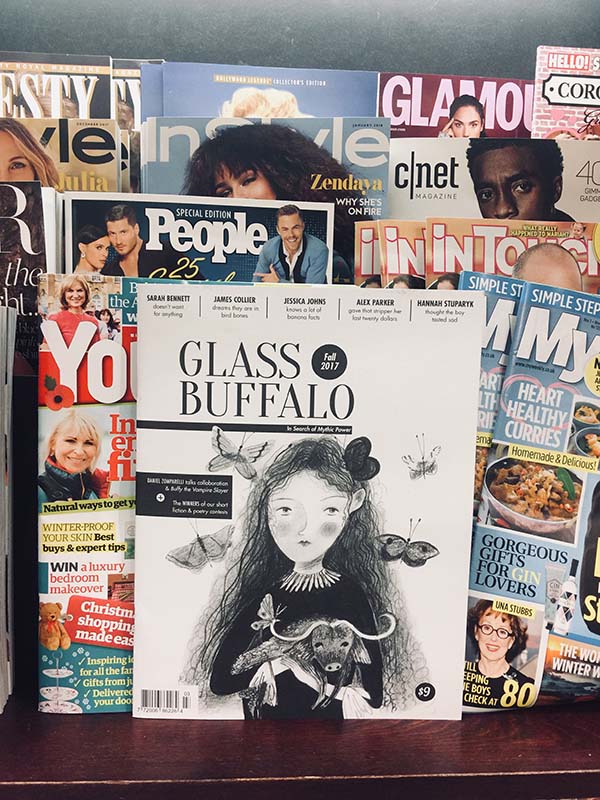
This is an ode to WRITE 298; to the students and their stories who have forever changed the way I not only tell mine, but the way I have learned to own them, embrace them and be empowered by my experiences.
Last year, at a time when I felt too mute for academia, I decided to take a creative writing class, WRITE 298 (Introduction to Writing Nonfiction) with Dr. Lahoucine Ouzgane, in the hopes that I could find the words to explain the many thoughts and emotions that left me anxious, lost and often wordless. I have always gravitated towards the power of words; I grew up filling my appetite for adventure though books, dog-earing every page that contained a passage explaining a feeling I could not communicate.
What I hadn't realized before taking this course was the art and movement in writing - especially your own - that could stem from a single instance of inspiration, and could become a catalyst of seeing, transforming and challenging the social constructs that bind you, sometimes without your knowledge.
"The course provides an opportunity for students to write about and delve deep into who they are, what their dreams are, what kind of person they would like to become," Dr. Ouzgane wrote to me in our initial exchange of introductory emails.
The full-year course required writing six personal essays - each one exposing a hope, a fear and a new insight. As a class, we would read each other's papers, providing feedback and constructive criticism throughout the term - a concept that absolutely terrified me. It was one thing to write about your vulnerabilities, it was an entirely different thing to have your peers discuss them in your presence.
Some of my classmates plunged right in, talking about everything from abusive relationships to struggles with mental illness, and I often left class with a heavy, yet inspired, heart. But many of us danced around our stories, trying to be the edited and politically-correct versions of ourselves. It was through our discussions, however, that we got to the heart of our essays - why did these topics and experiences matter to us and how did they connect to the world? This connection gave meaning to our writing, but it came with the responsibility of using honest diction that sometimes felt too raw for paper.
Over the course of the year, I watched my peers slowly break their metaphorical walls, and these breakthroughs were inspirational and emotional. It wasn't until the end of the first semester when I felt my own walls shake and begin to lose ground; I knew I had a story to tell, but I had no idea that this would become the start of a long healing process for wounds I hadn't realized I carried so deeply within me.
"If you know already what all your points are going to be when you sit down to write, the piece is likely to seem dry, dead on arrival," Phillip Lopate wrote in his anthology, The Art of the Personal Essay (Penguin Random House, 1997).
It took me four papers and an entire semester to finally understand this quote that we had read and analyzed numerous times before. To honour my story, I had to let go of my tight grip on rehearsing, editing and filtering my words before they even made it onto paper. This was not an easy process, however, and I wrote the same essay six times until I found my truth - and the final product stunned me.
What started off as my journey through the loss of a parent to cancer soon transformed into an analysis of gender inequality and oppression. Each version began to unravel a new emotion, from sad to angry to a state of resolve. By my sixth version, I was writing about my father's death and the ways religion and patriarchy barred me from participating in his burial, simply because I am a female.
Through the process of writing, I found a platform to grieve, unfiltered. I was able to detangle the complexity of emotions I had compartmentalized, and channel them into uncovering the social institutions set in place that serve as intentional and systematic disadvantages for some and not others. This was my "how does it matter" connection, because once I acknowledged these biases, I could actively resist them, and in turn, practice the set of ideals I valued.
Over the summer, Dr. Ouzgane had recommended that each of us submit our work to a national literary magazine for emerging writers, called Glass Buffalo. With a deep breath and absolutely no illusions of ever making the cut, I submitted my essay anyways. Two months later, I received an email from the editor, congratulating me on my first publication.
My journey with writing continues to venture into new domains as I navigate my way through life. It has become a ritual and a necessity.
WRITE 298 has given me the platform to create, but most importantly, it has taught me how to practice unfettered honesty with myself, and to be okay with finding new discoveries about the events and experiences of my past.
Mishma is a psychology major and sociology minor, entering her fifth (and final) year of undergrad. As a Community Service-Learning (CSL) student and former CSL intern, Mishma has a strong affinity for social justice, and is an avid volunteer in several non-profit organizations in the Edmonton community. She thrives on witty banter and a cup of strong coffee, and is guilty for watching terrible reality TV (who doesn't love "Keeping Up With the Kardashians"?) and reruns of "Cold Case Files."